How a Criminal Record Can Impact Your Personal Injury Claim
If you have a past criminal conviction, it does not preclude you from the right to receive fair compensation for damages you sustained due to another’s negligence. Your previous criminal record may not come out at all during your personal injury lawsuit. The opposing counsel can only reference your past directly if it is pertinent to the case at hand. For instance, a DUI conviction from 15 years ago is unlikely to be relevant if you have sustained injuries from a premises liability accident.
In case you have a prior conviction for any other offenses, the other side cannot ask any questions or discuss it in court. A judge or jury can only take into account the circumstances of the present case when deciding whether to award compensation for a car crash, and they cannot hold your previous driving record against you.
However, if you are on the witness stand giving your testimony, your past may be brought up in court. In such cases, the plaintiff’s past becomes more relevant as it may affect whether they are trustworthy as a witness. A skilled lawyer will do everything they can to keep your prior record out of court, but there are no assurances. A criminal record can damage you in some significant ways if it does come up during your case proceedings.
Perception and Credibility
The main threat a prior criminal record poses to your case is how it can make you look. This could be problematic if a jury is deciding your case. People often view criminal records of any type in an unflattering manner, and the defendant will use this to their benefit if they can.
The other side does reserve the right to consider your trustworthiness if you testify on your own behalf, and at this time, they may pull up previous criminal convictions and attempt to use them against you.
What to Do About It
It could be in your best interest for your trial to be heard by a judge instead of a jury. In general, a judge will be better able to remain dispassionate and make a decision based solely on the merits of the case. The emotional appeals from a skilled attorney on the other side could sway a jury.
Simply informing everyone about your criminal record right at the outset can also help you defend yourself. This does not allow the other side the possibility of “surprising” you with it later and can make the entire incident appear much less significant.
Impeachment
“Impeaching the witness” means catching a witness in a lie in the context of the courtroom. An attorney from the opposing side could use your criminal record to entrap you.
For example, you might think that your traffic ticket is not significant in a slip-and-fall case. Therefore, you may not suspect anything when an attorney questions you if you ever speed. However, if you testify that you do not speed and the attorney produces a speeding ticket, they have just caught you in a lie, and anything you say now is bound to be suspect.
What to Do About It
It is important to be mindful of the things that the opposing side could use against you. Your attorney can ensure that you do not miss something; and reviewing arrest records and conducting a background check on yourself can help anticipate everything that your adversaries will find about you.
Being forthright and honest about your past is an effective way to nip any problems in the bud. An experienced attorney can help you go over your testimony to prevent entrapment. In some cases, it may be possible to erase certain criminal convictions before going to trial. Don’t let a criminal record prevent you from seeking your rightful compensation for a personal injury.
Inform your Lawyer of your Criminal Record
It is vital to inform your attorney of any past criminal convictions at the beginning of your case when pursuing a personal injury claim. If your attorney is aware of any previous criminal convictions on your record, they can take pre-emptive steps to prevent it from being used against you by the other side.
Individuals who were convicted of a crime several years ago and have served out their sentences should not be further penalized as they have already served whatever penalties that the law deems suitable.
Therefore, you have the same legal rights as any other individual in matters not related to your conviction, which includes the right to seek and collect compensatory damages if you are injured due to the recklessness of others. A qualified lawyer can ensure that your rights are protected.
Strong Legal Support from a Qualified Personal Injury Lawyer
If you have sustained injuries in an accident, you must not assume that your past criminal convictions will affect the personal injury claim outcome. A seasoned attorney can help assess your case and review your criminal record to develop the best legal strategy for favorable results.
At the law offices of Olmstead and Olmstead, competent personal injury lawyers will evaluate your case in the light of Virginia’s civil and criminal records to ensure that you receive the compensation you deserve. To schedule a free initial consultation, call today at (703) 361-1555.











Leave a Reply
Want to join the discussion?Feel free to contribute!